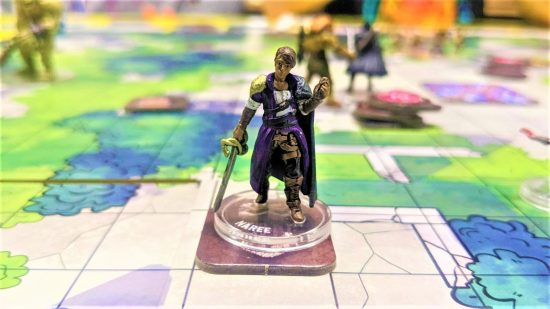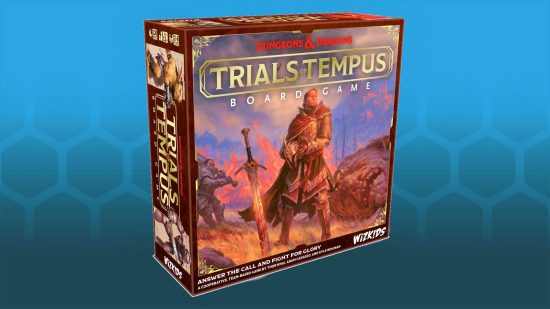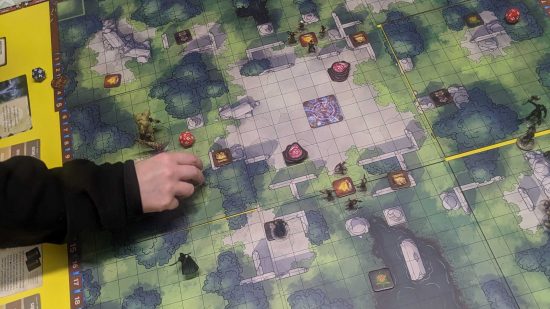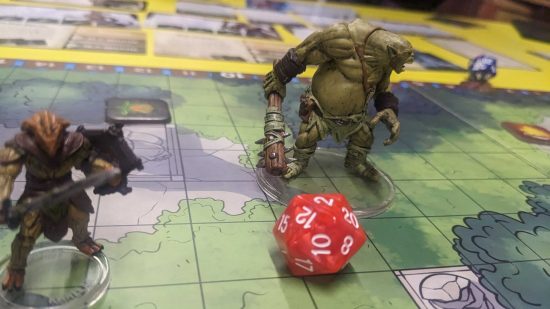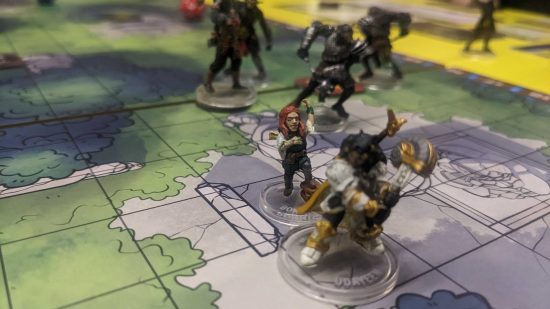Our Verdict
Dungeons and Dragons: Trials of Tempus comes with luxury minis and a high-end price tag, but the board game itself doesn't quite fit on the same pedestal. It's an engaging but slightly uninspiring play whose shine is dulled further by ineffective physical components.
Dungeons and Dragons: Trials of Tempus has big boots to fill. As a licensed D&D board game, it’s expected to recreate the feeling of the world’s oldest tabletop RPG. As a WizKids game, its minis must be of a certain caliber. And, with a cost of $100 to $200 (depending on whether you want the standard or luxury edition), it’s expected to really deliver value for money.
With new D&D board games rolling up all the time, I was keen to find out how Dungeons and Dragons: Trials of Tempus held up to these challenges. Thankfully, I was able to nab a review copy from WizKids to explore. I’ve only completed a handful of games at this stage – with a variety of player counts – so this review gives a largely early impression of the game.
Nevertheless, I’ve entered Tempus’ arena, taken on his trials, and unearthed the game’s core. Trials of Tempus is a board game of spotty successes. It’s an effective D&D adaptation with gorgeous minis, but its overall execution makes it look unpolished next to the very best board games.
What is Dungeons and Dragons: Trials of Tempus?
Dungeons and Dragons: Trials of Tempus is a team-based cooperative board game for two to eight players. Two teams of heroes are magically transported to an arena to battle in the name of Tempus, the war DnD god. The overarching goal of the game is to defeat the arena’s final Trial Guardian – and have more victory points than the other team when the final blow is dealt.
Each player chooses one of the classic DnD classes and builds a deck of cards based on their chosen subclass and DnD background. Everyone has unique abilities which can help in combat or skill check scenarios.
On your turn, you’ll have two actions to spend, which you can use to explore the arena, attempt to complete quests, pick up loot, or pick a fight. There are plenty of DnD monsters in the arena to take on, but you also can (and sometimes must) attack members of the opposing team. Many of these activities earn your team victory points – which you’ll need ten of to awaken the final boss of the trial (as well as to, you know, win).
What’s in Dungeons and Dragons: Trials of Tempus?
This is a WizKids game, so the big appeal for many will be the 25 DnD miniatures included in the box. They’re all unique and high-quality, and they look particularly snazzy with a paint job. Sadly, the same can’t be said for the rest of the components.
The arena is represented by an enormous board that’s split into nine separate pieces. Its visuals are very simplistic – which is a good thing when it comes to clearly establishing line of sight. My problems came more from the board itself which constantly split apart and slid around.
Things became even more fiddly when tokens got involved. Trials of Tempus includes 326 tokens, many of which are only distinguishable by the tiny writing printed on them. There’s no clear way to store and separate these tokens in the box, so I often ended up house-ruling the meaning of a generic token to avoid rifling through the entire game to find the specific one I needed.
The 24-page rulebook was also pretty unintuitive as it lacked a table of contents for easy navigation. There’s a back-page glossary with a summary of a handful of rules, but without clear direction, rules refreshers became a frustrating experience that also encouraged house-ruling to avoid stalling.
The real Trials of Tempus are trials of inconvenience. And believe me, I’m not afraid of busywork in board games – Frosthaven is one of the best titles I’ve played this year. But that game came with its own tutorial for organizing the box itself.
Is Trials of Tempus good or bad?
It’s a shame Trials of Tempus leaves such a fiddly first impression as there is potential hidden underneath.
As the game begins, figuring out how your class works and working with your teammates on a game plan feels explorative and exciting. Player-on-player combat felt tense and encouraged creative, strategic plays. Plus, with eight classes and four Trial Guardians to take on, Trials of Tempus has a decent amount of replayability.
Trials of Tempus is swing-y in all the right ways, regularly shifting the state of the battlefield so your plans have to adapt. A new event or a teammate dropping all their loot can dramatically change the scores, as well as how you’ll pick up victory points going forward. Each of the games I played was very close, with no team ever left behind without a chance of grasping victory.
Trials of Tempus also serves as an approachable intro to Dungeons and Dragons as a concept. Players who have no experience with the tabletop RPG were easily able to grasp core D&D concepts, and context knowledge wasn’t at all needed to get a game going.
Despite these strengths, Trials of Tempus failed to really wow me.
Impressive card combos were the exception rather than the rule, making many turns feel mundane. The game’s introductory Trial Guardian deals wince-worthy amounts of damage, but it has no game-altering abilities that make the final boss feel like the main event. Many in-game events felt repetitive or were easily ignored if they triggered at an inopportune stage of the game.
And while my games were delightfully swing-y, the game doesn’t try too hard to create a consistent experience. Trials of Tempus doesn’t adjust the game to accommodate different player counts, and a two-player game can feel very different from a six-player game. For example, in the latter, victory points are more evenly spread among players, and Trial Guardians are more easily killed.
Like D&D Onslaught, Trials of Tempus struggles to justify its luxury price. And in a world densely populated with skirmish board games, Trials of Tempus does little to stand out. It’s like making hot chocolate with water instead of milk – it’s pleasant, but it’s not particularly special.
